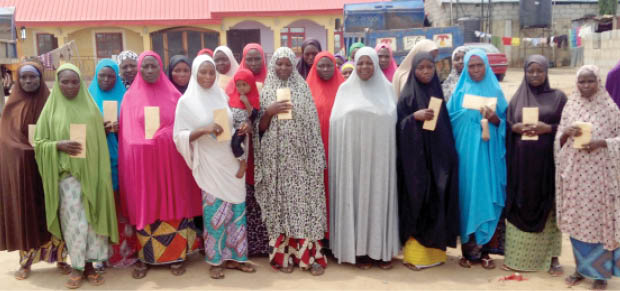Organisation provides revolving loans to rural women
Women entrepreneurship is crucial to economic growth around the world: from petty trading, small scale businesses to large scale enterprises. It offers them financial freedom and empowerment to contribute to the household and the country at large. For some of these women, it is a panacea to eradicating poverty and providing better and more comfortable […]

Some beneficieries of AWIC Women Revolving loans programme in Tunga Maje recently
Women entrepreneurship is crucial to economic growth around the world: from petty trading, small scale businesses to large scale enterprises. It offers them financial freedom and empowerment to contribute to the household and the country at large.
For some of these women, it is a panacea to eradicating poverty and providing better and more comfortable lives for them and their families.
Empowering petty women traders with revolving loans is an initiative planned by a Non-Governmental Organisation (NGO), Azzawaj Women and Children Intervention Centre (AWCIC), Abuja, to help these women boost their already existing businesses and help grow them into big businesses.
The initiative which was started by the organisation in 2017, is aimed at reducing the challenge of finance by women entrepreneurs, said the founder of the organisation, Hajiya Asmau Abe Wala.
Over the weekend, the organisation disbursed these loans to about 30 more women, and these loans were given to petty traders who are into buying and selling firewood, egusi, water and tailoring.
Hajiya Asmau said the loans were to support the women with capital for those willing to start their petty businesses and to also help sustain that of others who were already into business.
She said within one and a half years, over 100 women had been empowered with the loans; ranging from N5,000 to N20,000.
The women chosen from a cooperative each in Tungan Maje Community in Gwagwalada and Mabushi Community in Abuja Municipal Area Council (AMAC) were given between N5,000 and N20,000 depending on the kind of business they operate.
“We want to empower the women so that they are financially stable enough to send their children to school instead of asking them to go to the streets to hawk” she said.
“The loan is such that when these batch of women pay back, we will use the money to support the next batch of women that will collect in order to boost their businesses,” she added.
She, therefore, urged the women to be prudent in paying back so that others could benefit.
A member of one of the cooperatives, Hauwa Shuaibu, appreciated the scheme and called on other organisations and Micro-Finance Banks (MFBs) to emulate such gesture to make access to loans easy for women.
Jibril Salihu, the coordinator of the cooperative in Tungan Maje, said since the women began receiving the loans they had been experiencing boost in their businesses.
He said many had been able to slightly expand their businesses while others were planning to.
During the visit, the organisation also provided Ramadan food packages to over 100 families from three different communities in Abuja.
The NGO collaborated with the Jaiz Foundation on this to provide food items: rice, pasta, vegetable oil, noodles, tomato paste in each pack, each pack costing about N6,000, to Alheri Village in Kwali Area Council, where the Lepers Colony in Abuja reside, Tungan Maje in Gwagwalada Area Council and Mabushi Community in Abuja.
While appreciating the gesture, the Sarkin Kutare, Abuja, Ali Isa, said although the village had received a few charity donations from local and international NGOs, but that some only brought the donations only for publicity.
He said the previous weekend a charity organisation provided them with food items but pitched them with the villagers in the community such that once the organisation left the venue the villagers went away with almost all the donations.
AWCIC also provided clothes for the women and children in the communities to celebrate the Sallah.
